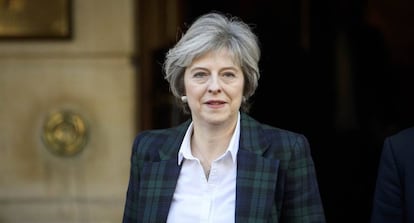An extremist ‘Brexit’
Prime Minister May takes a leap into the unknown and presses for a complete exit from the European Union
Until recently, the British government had been promising its citizens and businesses that they would not lose access to the EU single market. However, it also demanded permission to limit immigration and discriminate against European citizens, thereby undercutting free movement of people in the common area: this demand is legally impossible, morally perverse and politically unfeasible.

Prime Minister Theresa May came before Parliament on Tuesday to set out her road map for complete self-exclusion from the EU. This represents a radical change from her previous position: May is now proposing a complete split from Europe that breaks with her earlier promises and outlines a hard, extreme and extremist kind of Brexit. She has gone from professing a lukewarm, embarrassing pro-Europe stance as David Cameron’s home secretary, to defending a shameful, xenophobic nationalism.
The gist of her 12-point plan is Britain’s exclusion from a market of 500 million consumers, which will be reduced to 65 million and however many more may be added through new trade deals – a hypothetical and arduous task for a country that has lost experience in this field over the last four decades, as it fell exclusively to the Union; not to mention the fact that striking new trade deals requires years of negotiations every time, and that Britain will be facing an adverse protectionist climate at the global level.
The pound rose as money markets celebrated the fact that at least May has clarified some of her plans
May says all she wants is a bilateral treaty with the EU with zero mutual tariffs. But such a tariff already exists today, and it is maintained thanks to a common external tariff (the customs union) and to policies that avoid market distortion, such as defending competitiveness against asymmetrical public subsidies and dodgy tax avoidance (by multinationals), such as the EU is pursuing within the OECD framework. Or does Britain imagine that the future of a more social State, as new conservatism envisions, can really be sustained by becoming a complete tax haven? Not even Switzerland has managed it.
May holds that quitting the common market, leaving European jurisdiction and establishing a mere bilateral treaty will be advantageous to Britain. But those are just tactical advantages. No wonder that the German employers’ association has issued a reminder that if it has channelled investments to Britain worth €120 billion (and 400,000 jobs), it is thanks to the single market.
The gist of her 12-point plan is Britain’s exclusion from a market of 500 million consumers
Everything in May’s speech is grating. Her promise of a “positive” agreement is misleading. It is not positive to look down on European citizens or to discriminate against residents. Nor does it make any sense to issue threats against the Europeans that she will have to negotiate with during the next two years. Forced to promise that parliament (the representative of the sovereignty she champions) will vote on the final terms of Britain’s exit, she now defends this consultation. But she is being less than truthful when she asserts that an extremist Brexit will reinforce unity between the nations in her country (Scottish nationalists are stating the opposite, and Irish neighbors are observing fearfully).
As a result of the speech, the pound rose as money markets celebrated the fact that at least May has clarified some of her plans. And the predominant feeling in the EU was one of firmness and detachment in the face of so much incoherence and haughtiness.
English version by Susana Urra.
Tu suscripción se está usando en otro dispositivo
¿Quieres añadir otro usuario a tu suscripción?
Si continúas leyendo en este dispositivo, no se podrá leer en el otro.
FlechaTu suscripción se está usando en otro dispositivo y solo puedes acceder a EL PAÍS desde un dispositivo a la vez.
Si quieres compartir tu cuenta, cambia tu suscripción a la modalidad Premium, así podrás añadir otro usuario. Cada uno accederá con su propia cuenta de email, lo que os permitirá personalizar vuestra experiencia en EL PAÍS.
¿Tienes una suscripción de empresa? Accede aquí para contratar más cuentas.
En el caso de no saber quién está usando tu cuenta, te recomendamos cambiar tu contraseña aquí.
Si decides continuar compartiendo tu cuenta, este mensaje se mostrará en tu dispositivo y en el de la otra persona que está usando tu cuenta de forma indefinida, afectando a tu experiencia de lectura. Puedes consultar aquí los términos y condiciones de la suscripción digital.








































